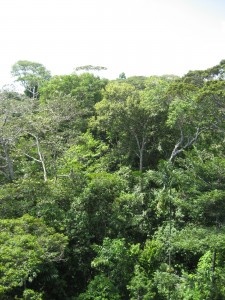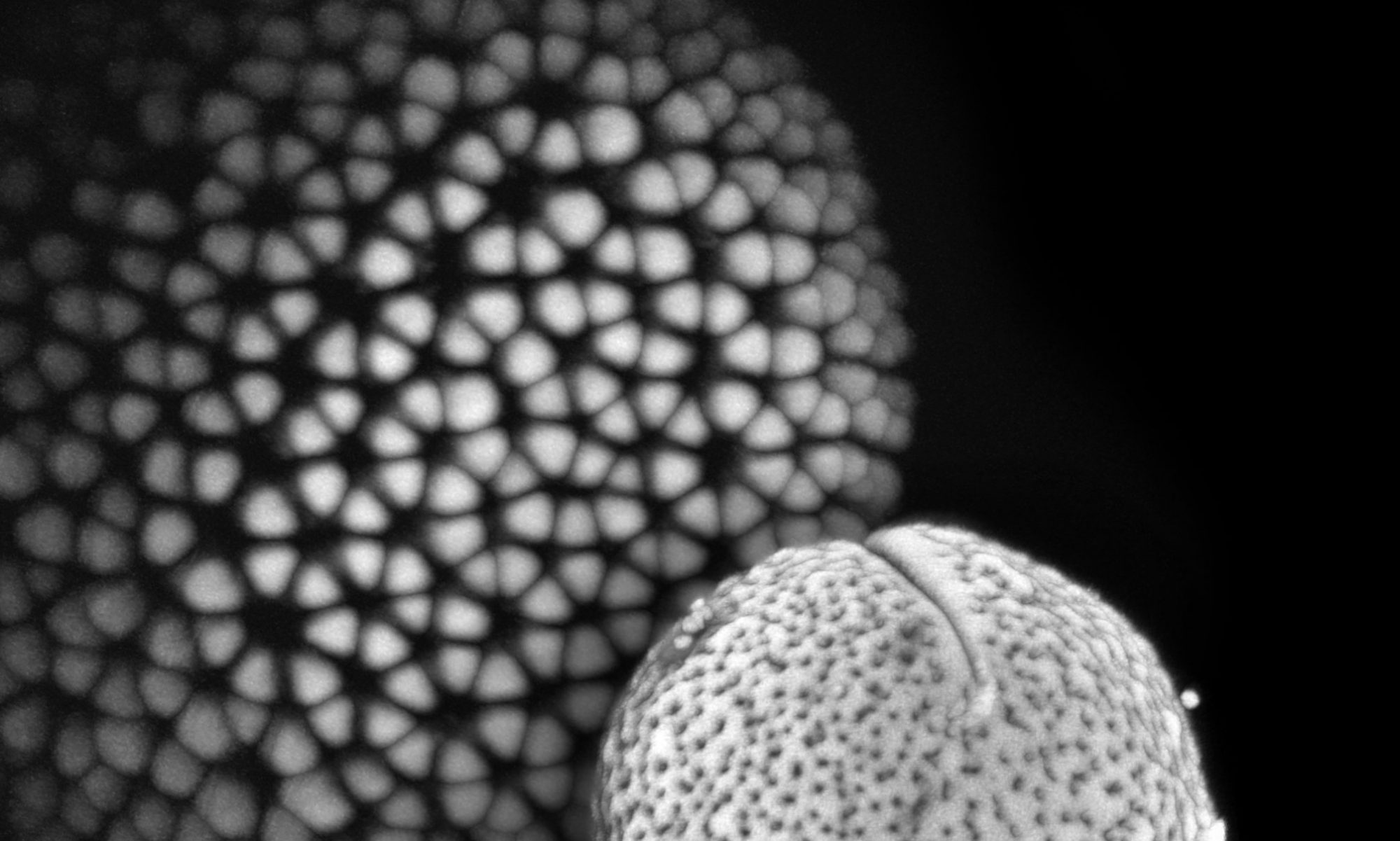 Derek – thanks in part to support from a Center for Latin American and Caribbean Studies (CLACS) Tinker grant – is back in Panama this month working at the Smithsonian Tropical Research Institute (STRI). He is visiting a long-time collaborator, J. Enrique Moreno, a STRI researcher at the Center for Tropical Paleoecology and Archaeology (CPTA). This is Derek’s second trip to STRI-CPTA. He is back working with the Alan Graham Tropical Pollen Reference Collection, curated by the lab group of STRI Staff Scientist Carlos Jaramillo. The Alan Graham Collection represents one of the largest modern reference collections of Neotropical pollen – with reference slides of over 25,000 species. Derek will be using the collection to help identify over 100 unknown pollen morphotypes from his counts of aerial pollen samples collected from Parque National San Lorenzo. Several hundred species of plants are potentially represented in the pollen rain of this high-diversity moist forest.
Derek – thanks in part to support from a Center for Latin American and Caribbean Studies (CLACS) Tinker grant – is back in Panama this month working at the Smithsonian Tropical Research Institute (STRI). He is visiting a long-time collaborator, J. Enrique Moreno, a STRI researcher at the Center for Tropical Paleoecology and Archaeology (CPTA). This is Derek’s second trip to STRI-CPTA. He is back working with the Alan Graham Tropical Pollen Reference Collection, curated by the lab group of STRI Staff Scientist Carlos Jaramillo. The Alan Graham Collection represents one of the largest modern reference collections of Neotropical pollen – with reference slides of over 25,000 species. Derek will be using the collection to help identify over 100 unknown pollen morphotypes from his counts of aerial pollen samples collected from Parque National San Lorenzo. Several hundred species of plants are potentially represented in the pollen rain of this high-diversity moist forest.
Lab receives new NSF Advances in Bioinformatics grant
We are excited to announce that the lab recently received funding through the National Science Foundation’s Advances in Bioinformatics (NSF-ABI) program for a new three-year collaborative project. The proposal “ABI Innovation: Breaking through the taxonomic barrier of the fossil pollen record using bioimage informatics” links the high-throughput, super-resolution structured illumination microscopy being employed at the University of Illinois with the morphological algorithms being developed by Washington Mio’s lab at Florida State and the machine learning advances made by Charless Fowlkes at University of California, Irvine.
Funding includes support for a graduate student with interest in microscopy, machine learning, and mathematical morphology – as well as pollen-curious undergraduates. Please contact Surangi (punyasena AT life.illinois.edu) for more information.
Cassie Wesseln receives NSF Graduate Research Honorable Mention

Cassie Wesseln, a first-year PhD student and former undergraduate researcher in the Punyasena lab, received an Honorable Mention from the National Science Foundation (NSF) Graduate Research Fellowships Program (GRFP) earlier this year. The NSF GRFP is one of the most competitive national fellowships available to graduate students in their first two years of study. A belated congratulations to Cassie!
Cassie is also currently an NSF Integrated Graduate Research and Education Traineeship (IGERT) fellow. The IGERT fellowship in Vertically Integrated Training with Genomics – a Smithsonian Tropical Research Institute (STRI) and UIUC collaboration – included a semester in Panama (Spring 2013). As a result of the program, Cassie was able to participate in a Tropical Ecology course led by STRI staff scientists, and in seminars and field trips conducted by over thirty different STRI scientists and fellows. In four short months, she visited almost all of the STRI research stations in Panama. Cassie adds: “It was an incredible experience in which I learned a great deal about the tropical biology and the research opportunities at STRI.”
2012 Wrap-Up
Last year was a very productive one for the lab – with four papers in print and two in press by late December. We had seventeen accepted abstracts, posters, and talks at national and international meetings, which meant that we were traveling the world for most of the year – from Boulder to Woods Hole to Portland to Charlotte to Vienna to Tokyo to Dublin. These abstracts included talks by collaborators: David Tcheng, Washington Mio, and Carlos Jaramillo; as well as talks by the core lab: Luke, Derek (his first!), and Surangi. The lab organized two sessions: Advancing High-Resolution, High-Throughput Research in Paleoecology at IOPC/IPC in Tokyo and The Future of Quantitative Paleontology: Biometry, Computer Vision & Machine Learning at GSA in Charlotte. Many of the other talks were invited – so we are glad to see that there’s growing interest in what we do!
Surangi was invited to participate in the Palaeo50 workshop at Oxford University; she co-chaired the “Approaches” section. She also gave two invited departmental seminars, one close to home at Illinois State University and one at Utrecht University, Netherlands. She and David were also invited speakers at a Department of Homeland Security meeting on pollen forensics – a first for the lab!
Three new PhD students started in 2012. Two were not so new – Derek completed his MS in PEEC in December 2011 and Cassie had been an undergraduate researcher in the lab since August 2009. The newest graduate student, Aleja, completed her MS with Mark Bush at FIT and spent a year working with Carlos Jaramillo at the Center for Tropical Paleoecology and Archaeology at the Smithsonian Tropical Research Institute.
Two lab members moved on in 2012. Stefan completed his MS in Plant Biology in May and Luke started a tenure-track position as Lecturer at Plymouth University, UK in October.
Finally, 2012 also saw the start of our second NSF grant – this one from Macrosystems Biology, on the Automated Analysis of the Reproductive Response of Two Panamanian Forests to ENSO Climate Variation – A Machine Learning Pilot Study. With this project, we hope to expand our previous work on the automated identification of black and white spruce to a significantly larger and more complex data set.
Thanks to everyone for all their hard work and effort last year. Here’s to another great year!
